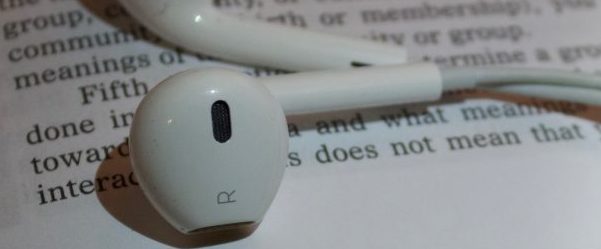By Madelyn Haasken
Even for people who love books, it can be a challenge for a busy college student to find time to read. Between class, work, extra-curricular activities and a social life, there isn’t a lot of free time – and when there is, most students would rather curl up on the couch and watch Netflix over sitting down to read a book. However, there is another option that’s becoming more and more popular – audiobooks.
According to the Audiobook Publishers Association, there were 34 percent more audiobooks published in 2017 than the number of books published in 2016.
While reading a book requires complete concentration, listening to an audiobook allows for multitasking, which is a common activity among busy students.
“Reading requires a setting, like a plush armchair; audiobooking is, almost by definition, in motion,” writes Arielle Pardes from Wired.
For Sydney South, a mass communications student, this element of flexibility is an important aspect of audiobooks. “I like audiobooks more, because I like to be productive throughout my day. I like to read a good book, but that’s the last thing on my mind. With an audiobook I can drive and listen to it, or work on stuff.”
While some believe audiobooks are great for stimulating the mind while doing other activities, others argue that reading is important for comprehension of information. They believe that the content is less retainable with audiobooks, and that it makes it easier to get distracted.
Luke Schmitz, a marketing communications student, agrees with audiobook critics. “People listen to audiobooks instead of reading, and I don’t think it does the same thing to your brain as picking up a real book. And then people are all like ‘oh look at me I listen to audiobooks’.”
Intellectually, is listening to an audiobook the same as reading?
The short answer – sort of.
Research has shown that reading and listening are quite similar cognitive processes. University of Virginia psychology professor Dan Willingham explains that “there isn’t much individual variance in the way people absorb information”. This means that those who prefer reading over listening (or vice versa) just like the feel of that particular medium – it doesn’t necessarily mean that they process one better than the other.
Comprehension of information is often dependent on what material the book is covering. In audiobooks, underlining and highlighting important phrases or words is non-existent – it’s also more difficult to go back and re-read (or re-hear) a certain part. For this reason, more complex information may be retained and understood better by reading a physical book.
However, when it comes to your average book, studies show that intellectually, reading and listening are fairly similar processes in the brain – neither is better or worse than the other.




